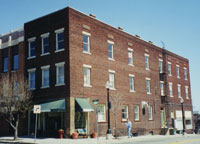The Harpie Club was formed in about 1924 by Truman's friends, mostly veterans and including many Jackson County employees, apparently simply because they liked him and wanted to formalize to some degree their poker games together. There were usually about 16 to 18 members. They played poker usually one night a week; games had a ten cent limit with three raises. The club met regularly until sometime in the late 1950s, and did not disband until sometime in the early or mid 1960s. It had an obscure origin in a harmonica contest and was called the Harmonica Club for a time. A tiny man--about four and a half feet tall--named Port Sampson played several different harmonicas at a dedication ceremony. Arthur Metzger, who was related to Sampson and who was later Truman's partner in a savings and loan venture, apparently provided financial support to the club. The name of the club gradually transmogrified into Harpie Club partly because of an alleged identification of the harmonica with the French harp.
The club met initially and for the greater part of about 30 years at 101 N. Main Street, Independence, in a back room on the third floor. It also met at other locations on and near Independence Square, and occasionally met in members' homes. Members included, besides Harry Truman, Edgar Hinde, John Hutchison, Mize Peters, Fred Soapes, Alvin Hatten, Dexter Perry, Albert Ridge, L. L. "Polly" Compton, Joe Clements, Hugh Miller, Hunter Allen, Russell Gabriel, William Duke, Bruce Lambert, and Roger T. Sermon.
The austere, probably somewhat dingy room in which the Harpie Club met was furnished only with a poker table and chairs, an ice box, and a beer pump or cocktail bar. The games were good natured. Truman got immense enjoyment from poker, and he apparently never took the game too seriously. Club member Bruce Lambert called Truman a "chump" who always stayed to the end of a hand. "…He wanted to see what your hole card was, and knew anyone got a kick out of winning from him and he accommodated…[but] if he could whip you he got a big kick out of it." (Oral history interview with Bruce E. Lambert, Truman Library, 1981.) Others who played with Truman noted other habits he had. "[Harry] always plays a close hand, I'll say that," Ted Marks, who first met Truman in 1906 and became a close friend during World War I, recalled. "You can tell when he's winning, because there's a kind of smile on his face." (Ted Marks oral history interview, Truman Library, 1962.) Harry Vaughan, who possibly played his first poker game with Truman as early as 1918 and was a regular in games held while Truman was President, remembered a tactic that Truman particularly enjoyed. "He liked to bluff and he did it on numerous occasions, but don't count on it…. It was of greater delight to him to chase me…out of a hand and then show me that I had him beat--that was worth a month's pay. And he did it all too frequently." (Harry H. Vaughan oral history interview, Truman Library, 1963.)
Truman attended one Harpie Club meeting, held at Roger T. Sermon's house at 701 Procter Street, while he was President. The presence of the President of the United States gave a special, formal character to this meeting--no one would sit down, for instance, until Truman did--but a poker game got underway nonetheless. Truman won steadily and accumulated a big pile of chips. A Secret Service man tapped him on the shoulder and said it was time to leave. "The President jumped up hastily," one of his poker partners remembered, "and said, 'Good-bye boys,' and shot out the door, leaving all those chips, which were cashable for money. I wonder to this day who got the money." (Oral history interview with A. J. Stephens, Truman Library, January 6, 1966.)
